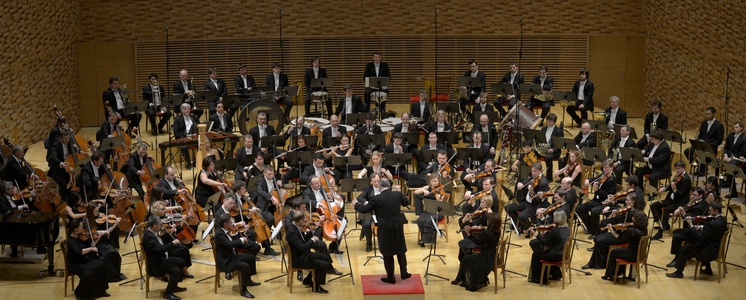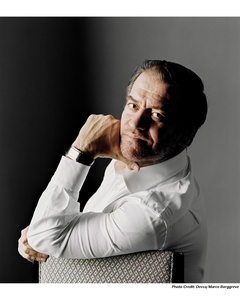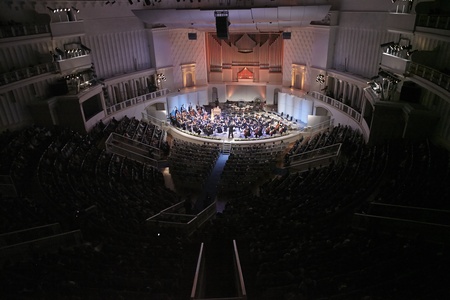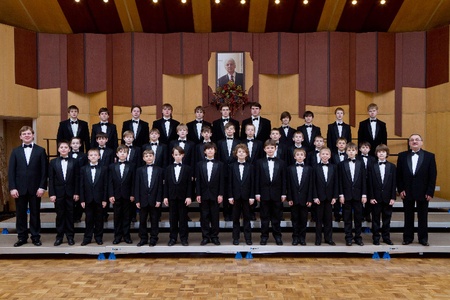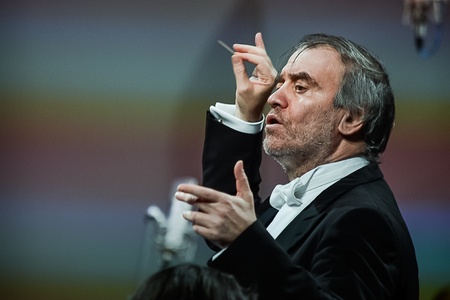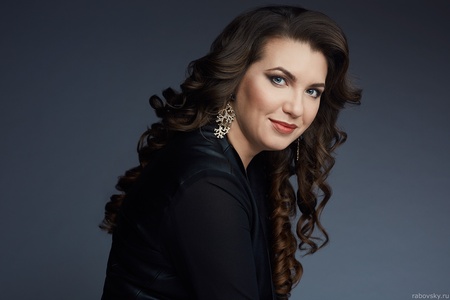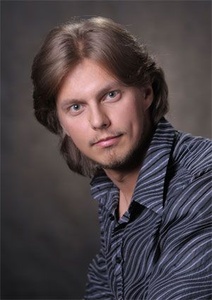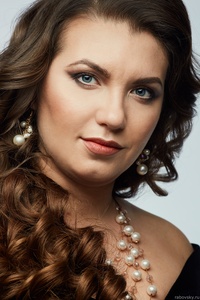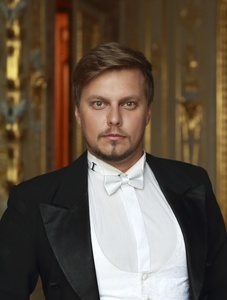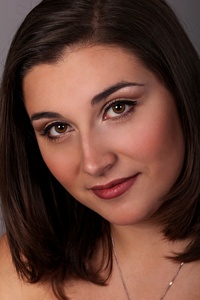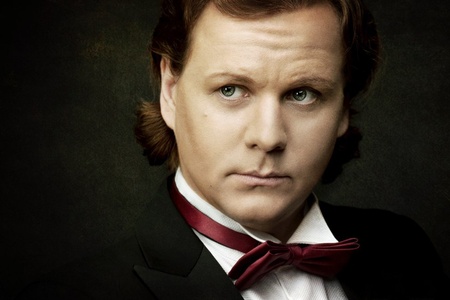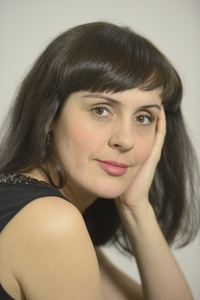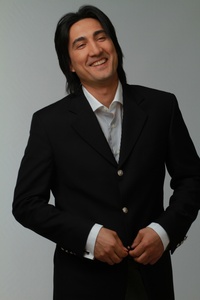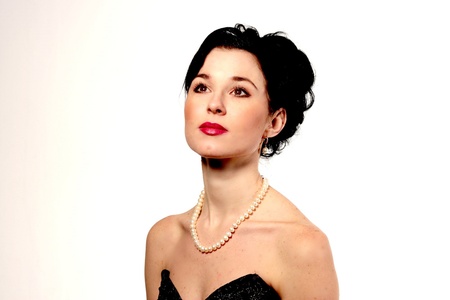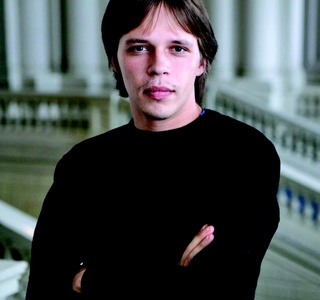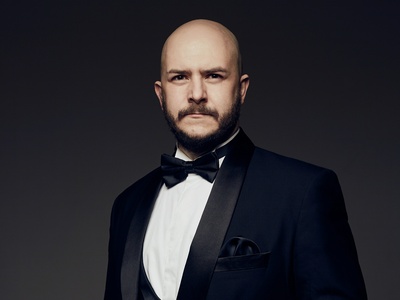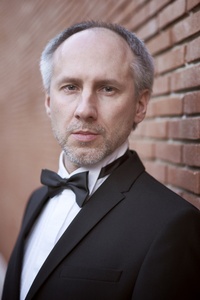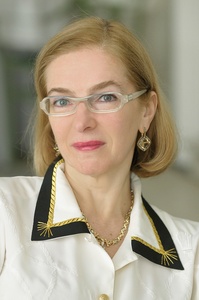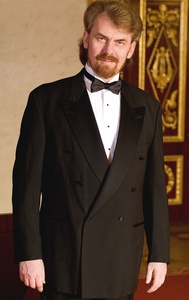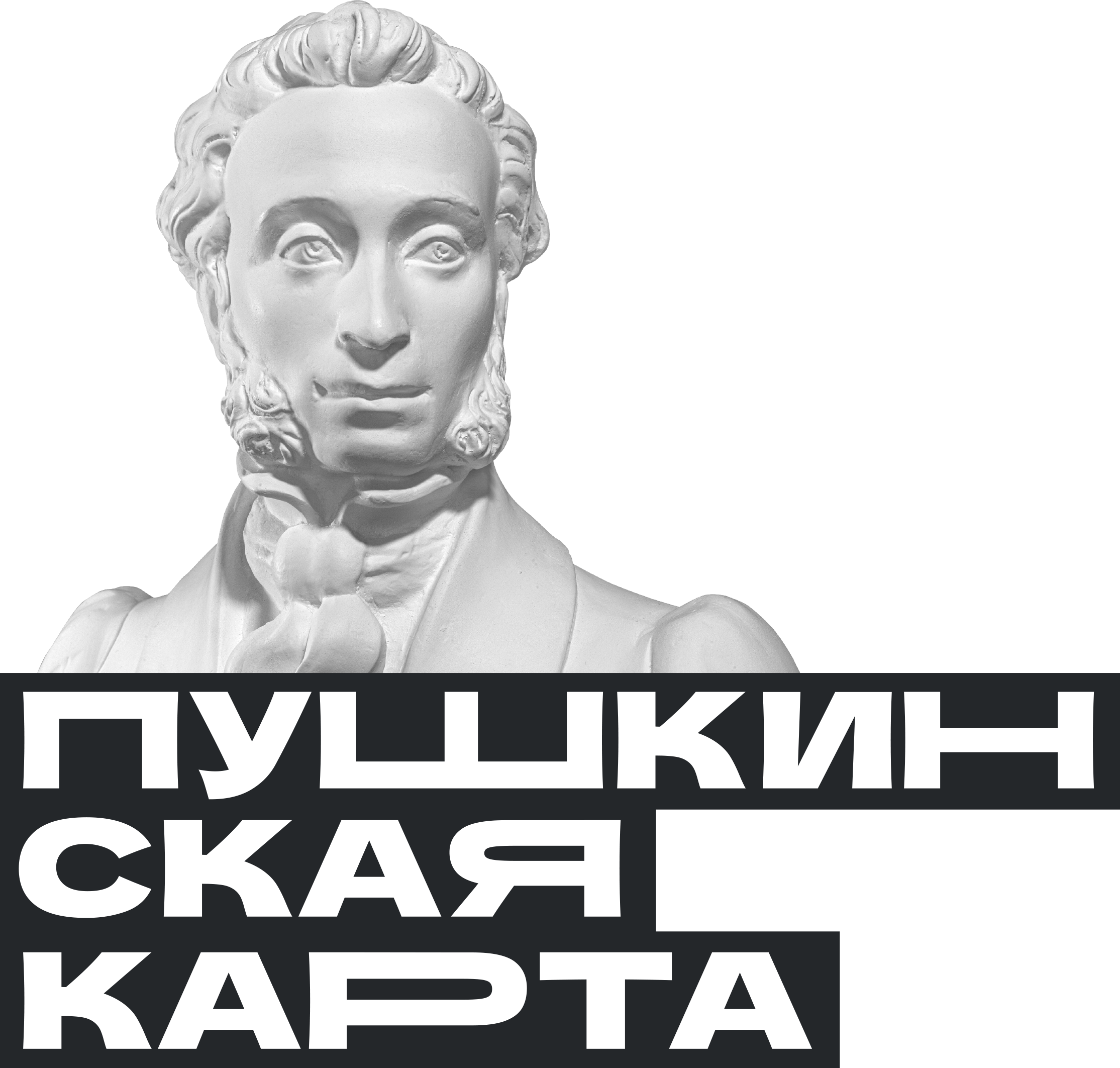Tchaikovsky. "Queen of Spades",
opera in a concert performance
June 11, 2018
Tchaikovsky Concert Hall
directions to the hallMariinsky Orchestra
Mariinsky Theatre Choir
Valery Gergiev, conductor
Nazhmiddin Mavlyanov (tenor)
Irina Churilova (soprano)
Irina Bogacheva (mezzo-soprano)
Alexey Markov (baritone)
Roman Burdenko (baritone)
Yulia Matochkina (mezzo-soprano)
Anna Denisova (soprano)
Yury Vlasov (bass)
Alexander Trofimov (tenor)
Vladimir Felyauer (bass)
Andrey Zorin (tenor)
Ekaterina Krapivina (mezzo-soprano)
Pelageya Kurennaya (soprano)
Boys Choir of the Sveshnikov Choir College
Responsible concertmaster Irina Soboleva
Program:
Tchaikovsky
"Queen of Spades", opera in a concert performance

Mariinsky Orchestra
The Mariinsky Orchestra is a unique theatre orchestra with an intense concert schedule. It is ranked among world’s best orchestras according to a survey among top music critics of major European, American and Asian magazines.
The orchestra is over two hundred years old. It was founded by Catarino Camillo Cavos, who then led the musicians for nearly 50 years, and Konstantin Lyadov. The Mariinsky Orchestra flourished under Eduard Napravnik, who expanded the theatre’s repertoire by over 100 productions, bringing the orchestra up to the European performing standards. Napravnik’s effort was continued by outstanding Soviet conductors including Vladimir Dranishnikov, Ariy Pazovsky, Yevgeny Mravinsky, Sergey Yeltsin, Boris Khaikin, Pavel Feldt, Konstantin Simeonov, and Yuri Temirkanov.
Throughout the history of the orchestra, it has been conducted by Hector Berlioz, Richard Wagner, Pyotr Tchaikovsky, Gustav Mahler, Arthur Nikisch, Hans von Bülow, Sergei Rachmaninov, Willem Mengelberg, Otto Klemperer, Bruno Walter, Erich Kleiber, and Arnold Schoenberg.
Despite performing daily at the theatre’s three stages, the orchestra still manages to meet its tight tour schedule.
Since 1988, the orchestra has been directed by Valery Gergiev. With the maestro’s arrival, the orchestra’s repertoire has expanded significantly. In addition to operas (first and foremost the tetralogy Der Ring des Nibelungen as well as all of Wagner’s other operas starting with Lohengrin performed in German, all of Prokofiev and Shostakovich’s operas, the lion’s share of Rimsky-Korsakov and Tchaikovsky’s opera legacy, both of Musorgsky’s versions of Boris Godunov and operas by Richard Strauss, Janáček, Mozart, Verdi, Berlioz, Puccini and Donizetti), the orchestra’s repertoire has come to include symphonic works and other genres of philharmonic music. The orchestra has performed every symphony by Beethoven, Brahms, Mahler, Tchaikovsky, Prokofiev and Shostakovich and various works by composers such as Stravinsky, Messiaen, Dutilleux, Henze, Shchedrin, Tishchenko, Gubaidulina, Kancheli, Karetnikov and Raskatov among many others.
Valery Gergiev
Valery Gergiev is a vivid representative of the St Petersburg conducting school and a former pupil of the legendary Professor Ilya Musin. While still a student at the Rimsky-Korsakov Leningrad State Conservatory, Gergiev won the Herbert von Karajan Competition in Berlin and the All-Union Conducting Competition in Moscow, following which he was invited to join the Kirov Theatre (now the Mariinsky) as an assistant to the principal conductor. His debut as a conductor at the theatre came on 12 January 1978 with Sergei Prokofiev’s opera War and Peace. In 1988 Valery Gergiev was appointed Music Director of the Mariinsky Theatre, and in 1996 he became its Artistic and General Director (leading the orchestra and opera and ballet companies).
With the arrival of Valery Gergiev at the helm, it became a tradition to hold major thematic festivals marking various anniversaries of composers. In 1989 there was a festival marking one hundred and fifty years of Modest Mussorgsky, in 1990 there was one commemorating one hundred and fifty years of Pyotr Tchaikovsky, in 1991 there was another marking one hundred years of Sergei Prokofiev, and in 1994 there was another marking one hundred and fifty years of Nikolai Rimsky-Korsakov. These festivals saw performances not only of well-known scores but also of rarely performed pieces or works that had never been staged before at all. The tradition of anniversary festivals has continued in the 21st century with a celebration of one hundred years of Dmitry Shostakovich in 2006, another marking one hundred and seventy-five years of Pyotr Tchaikovsky in 2015, a third marking one hundred and twenty-five years of Sergei Prokofiev in 2016 and a fourth marking one hundred and seventy-five years of Nikolai Rimsky-Korsakov in 2019.
Through maestro Gergiev’s efforts the Mariinsky Theatre has revived operas by Richard Wagner. In 1997 came Parsifal, which had not been performed in Russia for more than eighty years, in 1999 Lohengrin was revived, and by 2003 the grandiose operatic tetralogy Der Ring des Nibelungen had been staged in full. That was the first time following an interval of almost a century that the complete tetralogy was staged in Russia and the first production in Russia to be performed in the original German. The tetralogy has been performed on Mariinsky Theatre tours to great acclaim in Moscow as well as abroad – in the USA, South Korea, Japan, Great Britain and Spain. The theatre’s repertoire also includes productions of Tristan und Isolde (2005) and Der Fliegende Holländer (1998, 2008).
The Mariinsky Orchestra under Valery Gergiev has scaled new heights, assimilating not just opera and ballet scores but also an expansive symphony music repertoire – every symphony by Beethoven, Brahms, Tchaikovsky, Mahler, Sibelius, Prokofiev and Shostakovich and works by Berlioz, Bruckner, Rimsky-Korsakov, Richard Strauss, Scriabin, Rachmaninoff, Stravinsky, Messiaen, Dutilleux, Ustvolskaya, Shchedrin, Kancheli and other composers.
Under the direction of Valery Gergiev the Mariinsky Theatre has become a major theatre and concert complex, without par anywhere in the world. In 2006 the Concert Hall was opened, followed in 2013 by the theatre’s second stage (the Mariinsky II), while since 1 January 2016 the Mariinsky Theatre has had a branch in Vladivostok – the Primorsky Stage and since 2017 in Vladikavkaz. Other projects of Valery Gergiev hosted by the Mariinsky Theatre include media broadcasting, on-line broadcasts of concerts and the establishment of a recording studio. 2009 saw the launch of the Mariinsky label, which to date has released more than thirty discs that have received great acclaim from the critics and the public throughout the world; these recordings include symphonies by Tchaikovsky and piano concerti by Tchaikovsky and Shostakovich, operas by Wagner, Massenet and Donizetti and an entire plethora of other works. Works by Verdi (Attila), Tchaikovsky (symphonies), Rimsky-Korsakov (The Tale of Tsar Saltan, The Golden Cockerel), Strauss (Die Frau ohne Schatten), Prokofiev (Romeo and Juliet, Cinderella, The Gambler, Semyon Kotko), Shchedrin (The Lefthander) have been released on DVD.
Although Valery Gergiev’s international activities are no less intensive and active, nowadays he is focused on the work in Russia, first of all, at the Mariinsky Theatre. Having made debuts in 1991 at the Bayerishe Staatsoper (Mussorgsky’s Boris Godunov), in 1993 at the Royal Opera House, Covent Garden (Tchaikovsky’s Eugene Onegin) and in 1994 at the Metropolitan Opera (Verdi’s Otello with Plácido Domingo in the title role), the maestro successfully continues to collaborate with the world’s great opera houses. He works with the World Orchestra for Peace (which he has directed since 1997 following the death of the ensemble’s founder Sir Georg Solti), the philharmonic orchestras of Berlin, Paris, Vienna, New York and Los Angeles, the symphony orchestras of Chicago, Cleveland, Boston and San Francisco, the Royal Concertgebouw Orchestra (Amsterdam) and many other ensembles. From 1995 to 2008 Valery Gergiev was Principal Conductor of the Rotterdam Philharmonic Orchestra (of which he remains an honorary conductor to this day), and from 2007 to 2015 he was Principal Conductor of the London Symphony Orchestra. In 2015–2022 the maestro has headed the Munich Philharmonic and in 2018–2022 the Verbier Festival Orchestra.
Valery Gergiev is the founder and director of prestigious international festivals including the Stars of the White Nights (since 1993), the Moscow Easter Festival (since 2002), the Gergiev Festival in Rotterdam, the Mikkeli Music Festival (Finland) and the 360 Degrees festival in Munich. Since 2011 he has directed the Organizing Committee of the International Tchaikovsky Competition. Valery Gergiev focuses much of his attention on working with young musicians. One of his initiatives saw the revival of the All-Russian Choral Society; this includes the Children’s Chorus of Russia, which has appeared at the Mariinsky II, the Bolshoi Theatre of Russia and at the closing ceremony of the XXII Winter Olympics in Sochi. In 2013–2022 the maestro has directed the National Youth Orchestra of the USA and regularly appeared with the youth orchestras of the Schleswig-Holstein Festival, the Verbier Festival and the Pacific Ocean Music Festival in Sapporo. Since 2015 the Mariinsky Theatre has run the Mariinsky NEXT annual festival, which features children’s and youth orchestras of St Petersburg.
Valery Gergiev’s musical and public activities have brought him three State Prizes of the Russian Federation (1993, 1998 and 2015), the titles of People’s Artist of the Russian Federation (1996) and Hero of Labour (2013), the Order “For Merit to the Fatherland” III and IV classes (2003, 2008), the Order of Alexander Nevsky (2016), the Russian Federation Ministry of Defence Arts and Culture Award (2017) and prestigious state awards of Armenia, Bulgaria, Germany, Italy, the Netherlands, Poland, France and Japan.
Irina Churilova
In 2009 Irina Churilova graduated from the Novosibirsk State Glinka Conservatoire (class of Zinaida Didenko). Has taken part in master-classes given by Diane Zola and Montserrat Caballé and trained under Enza Ferrari.
Since 2008 she has been a soloist with the Novosibirsk State Academic Opera and Ballet Theatre.
Prize-winner at the Valeria Barsova Vocalists’ Competition (Sochi, 2008 1st prize); finalist at the Operalia competition (Verona, 2013), prize-winner at the Concours international de chant de Toulouse (2012, 2nd Grand-prix), at the Francisco Viñas International Singing Contest (2014), at the Hans Habor Belvedere Competition (Düsseldorf, 2014, 1st prize).
Made her Mariinsky Theatre debut in 2013, appearing as Marguerite in the premiere of a new production of Faust. Since then she has regularly appeared in St Petersburg. For the role of Liza in The Queen of Spades she received a nomination for Russia's Golden Mask theatre prize.
Irina Churilova has appeared in tour performances by the Mariinsky Opera in Baden-Baden (The Queen of Spades), Tokyo (Don Carlo) and Shanghai (The Queen of Spades). Last season she appeared with the Mariinsky Orchestra in Pamplona (Mahler's Symphony No 2).
As a guest soloist she also performs at Russia's Bolshoi Theatre. In 2012 she was invited by Montserrat Caballé to take part in her anniversary concert at the Gran Teatre del Liceu.
In the 2016-17 season she made her debuts as Norma at the Oper Graz and as Aida at the Arena di Verona festival.
Alexey Markov
In 2001 he joined the Mariinsky Academy of Young Opera Singers. Soloist with the Mariinsky Opera since 2008. Has regularly appeared at the Mariinsky Theatre since 2006 in the lead baritone repertoire.
Alexei Markov has toured with the Mariinsky Opera in Germany, USA, Great Britain, Japan, Netherlands, Finland, Israel.
The singer collaborates with internationally acclaimed conductors including Yuri Temirkanov, Mariss Jansons, James Levine, Marco Armiliato, Nello Santi, Louis Langrée, Daniele Callegari, Teodor Currentzis, Andris Nelsons, Mikhail and Dmitri Jurowski.
Prize-winner at the VI International Rimsky-Korsakov Young Opera Singers’ Competition (1st prize, St Petersburg, 2004), at the All-Russian Nadezhda Obukhova Competition (2nd prize, Lipetsk, 2005), at the IV International Elena Obraztsova Young Opera Singers’ Competition (1st prize, St Petersburg, 2005), at the international Competizione dell’Opera (2nd prize, Dresden, 2006), at the International Moniuszko Competition (1st prize, Warsaw, 2007). Recipient of Russia’s Golden Mask theatre prize for the role of Ivan Karamazov in the opera The Brothers Karamazov (“Best Male Role in Opera”, 2009), of the Golden Sofit, St Petersburg’s most prestigious theatre prize, for the role of Robert in the opera Iolanta (“Best Male Role in Musical Theatre”, 2009) and the Montblanc New Voices award Winner (2009).
For more detailed information about Alexei Markov please visit his official website at www.alexey-markov.com.
Roman Burdenko
Studied at the Novosibirsk Glinka Conservatoire (class of Vladimir Prudnik) before transferring to the St Petersburg Rimsky-Korsakov Conservatoire from which he graduated in 2008 (class of Vladimir Vaneyev). In 2009 he trained on the Young Opera Singers programme at the Accademia Nazionale di Santa Cecilia. From 2006 to 2011 Roman Burdenko was a soloist at the Mikhailovsky Theatre, then was a soloist at the Novosibirsk Opera. He made his Mariinsky Theatre debut in 2013 and joined the Mariinsky Opera Company in 2017.
He has appeared as a guest soloist at the Bolshoi Theatre, Bayerische Staatsoper, Zürich Opera, Royal Danish Opera, Grand-Théâtre de Genève, Glyndebourne Festival. For the role of Igor Svyatoslavich he was nominated for Russia’s national Golden Mask theatre award in the category “Best Male Role in Opera” (Novosibirsk Theatre of Opera and Ballet, 2010).
Prize-winner at the All-Russian Open Opera Singers’ Competition (St Petersburg, 2007, Grand-prix), at the International Galina Vishnevskaya Opera Singers Competition (Moscow, 2008, 1st prize), at the International Competition Villa de Colmenar Viejo (Colmenar Viejo, 2009, 2nd prize), at the International Francesc Viñas Competition (Barcelona, 2011, 3rd prize), at the International Long – Thibaud – Crespin Competition (Paris, 2011), at the International Competition Monte Carlo Voice Masters (Monaco, 2011, Grand-prix), the International Competition Operalia (Beijing, 2012, 3rd prize), at the at the International Hans Gabor Belvedere Singing Competition (Amsterdam, 2013, 2nd prize).
Andrey Zorin
Born in Komsomolsk on Amur (Khabarovsk Krai). In 2002 he graduated from the Vladivostok Academy of Arts. Soloist with the Mariinsky Academy of Young Singers from 2002. Joined the Mariinsky Opera Company in 2007.
Roles he has performed at the Mariinsky Theatre include: Herod (Salome), Mime (Das Rheingold), Grisha Kuterma (The Legend of the Invisible City of Kitezh and the Maiden Fevronia), Ovlur, Yeroshka (Prince Igor), Kochkarev (The Marriage), Afanasy Ivanovich (Sorochintsy Fair), Khrushchev the Boyar, Jesuit, Misail (Boris Godunov), Minion, Scrivener (Khovanshchina), Triquet (Eugene Onegin), Chaplitsky, Master of Ceremonies (The Queen of Spades), Drunken Cossack (Mazepa), Balakin (The Enchantress), Alméric (Iolanta), Sopel (Sadko) and many other parties.
Has toured with the Mariinsky Opera Company to the UK, Germany, Sweden, Finland and Spain. He has given solo recitals in China and Japan. In 2003 he took part in the Mikkeli International Festival, where he performed as Kochkarev in The Marriage and as Vyrin (Alexander Smelkov’s The Station Guard).
At the VIII Moscow Easter Festival he performed the role of Don Bartolo (L nozze di Figaro).
Boys Choir of the Sveshnikov Choir College
Руководители хора и дирижеры:
Заслуженный артист России Александр Шишонков
Алексей Петров
Андрей Герасименко
«Точные, блестящие, богатые обертонами, превосходно артикулирующие» (Badische Neue Nachrichten), «уникальная голосовая культура с опорой на великолепный материал» (Kolnische Rundschau), «настоящее музыкальное пиршество высшего качества» (Arena Alva) – так немецкая пресса оценила Хор мальчиков – вечно юный и одновременно самый старший из всех концертных коллективов Академии хорового искусства имени В.С. Попова.
Дата рождения хора – военный 1944 год, когда выдающийся русский музыкант-просветитель Александр Васильевич Свешников основал Московское хоровое училище для обучения мальчиков и юношей, из которых и воспитал знаменитый в будущем коллектив. Звучание этого хора стало со временем эталоном высокого искусства.
История Хора мальчиков богата именами и событиями. Из стен хорового училища за 67 лет выпущено около пятисот профессионалов-музыкантов, которые вносили и вносят в настоящее время серьезный вклад в развитие музыкальной культуры России. Среди них дирижеры – Александр Юрлов, Владимир Минин, Борис Куликов, Евгений Тытянко, Игорь Раевский, Леонид Николаев, Эдуард Серов, композиторы – Родион Щедрин, Александр Флярковский, Ростислав Бойко, Владислав Агафонников, Валерий Кикта, Эдуард Артемьев, певцы – Михаил Никифоров, Всеволод Гривнов, Дмитрий Корчак, Василий Ладюк, Николай Диденко и многие другие.
Вдохновленные ангельским звучанием детских голосов, для хора писали музыку Прокофьев и Шостакович, с ним выступали в концертах знаменитые дирижеры — Николай Голованов, Евгений Мравинский, Самуил Самосуд, Кирилл Кондрашин — и всегда охотно пели выдающиеся артисты – 3ара Долуханова, Иван Петров, Ирина Архипова, Иван Козловский, Дмитрий Хворостовский, Анна Нетребко.
Новый творческий подъем коллектив пережил в 70-х годах, когда его возглавил ученик А.В. Свешникова, выдающийся мастер хорового дела Виктор Сергеевич Попов, который создал на базе училища уникальное учебное заведение, не имеющее аналогов в мире – Академию хорового искусства.
С созданием Академии Хор мальчиков стал частью единого хора Академии и в то же время остался самостоятельным творческим коллективом.
В настоящее время хор мальчиков Хорового училища продолжает интенсивную концертную деятельность. С ним охотно сотрудничают такие известные дирижеры, как Владимир Федосеев, Владимир Спиваков, Михаил Плетнёв и многие другие. Наряду с этим хор мальчиков регулярно выступает с сольными программами как в России, так и за рубежом, концертирует в составе сводного хора Академии на международных фестивалях во Франции, Германии, Швейцарии, Японии.
Сегодня Хор мальчиков – достояние и гордость российской музыкальной культуры, основа исполнительских сил Академии хорового искусства имени В.С. Попова, ее будущее. Выступления юных музыкантов приумножают художественные традиции и славу русской вокальной школы.

